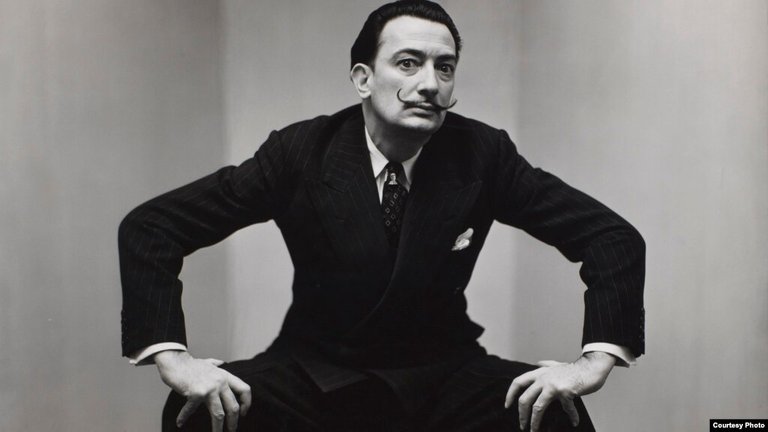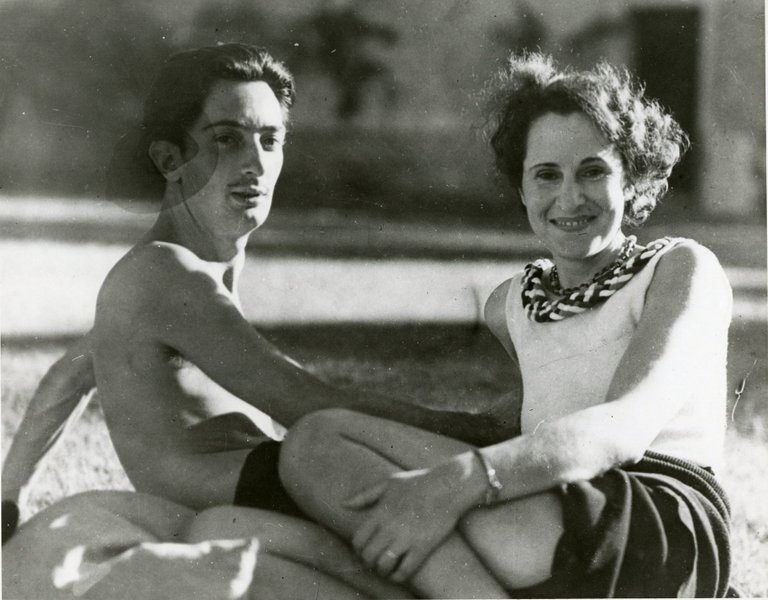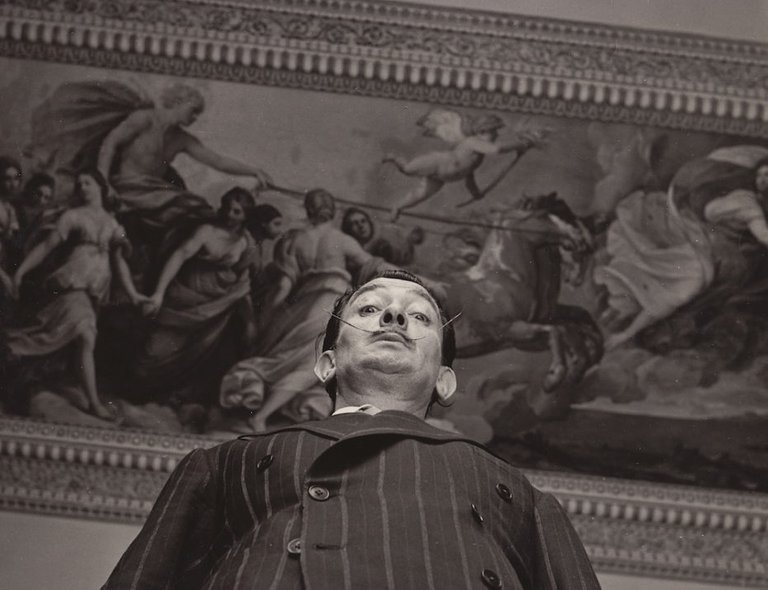
Salvador Dali is an artist known by everyone, a great Surrealist. Every single person may not see the majority of his works but nobody can deny the fact that he is one of the superstars among the modern painters famous not only for his work but for his eccentric personality and looks.
This is not a story about his work, career and commercial success, though, but about some interesting data related to his personal life extracted from his own book and some psychological studies. Most of the artists of his era were very disappointed that his personal actions and eccentricities dominated what his art and art in general is all about, but his life was a proof that he needed more understanding of his fellow colleagues.
His ability to express his talent is an important aspect of the story; it is believed his paintings revealed more of his personality and personal influences and his own internal life than he wanted others to know. He tried hard to represent his individuality and personal choices as something unique and extraordinary, calling himself „a genius“ but is that something to take for a fact and does it inevitably make one wonder about that popular quote „There is a thin line between genius and insanity“. Is it? Or it is just the talent the inevitable medium to express what tortures one's naked soul and it has nothing to do with being extraordinary. Thinking about yourself as a genius is a well known self-defense mechanism for the pain one endured.

Born in 1904 he was the second child of his parents, third one being the sister three years younger than him. Their firstborn son was named Salvador after the father because it was usual to name the oldest son like his father. Unfortunately the little one died being 21 months old of gastroenteritis and after exactly nine months and ten days Salvador Dali was born. Dali himself writes his brother died when he was seven and that he died of some form of brain inflammation, three years before the painter was born, which is not true. The reason why he intentionally misinterpreted that information is probably to cause some effect by redirecting readers into his own fantasy world (just like when he described his memory of being in his mother’s womb or creating his own “false memories”); or to emphasize influence his brother’s existence had when it comes to his own.
It is interesting that their parents gave him the exact same name like his late brother's. That wasn't the only unusual thing, though. There are sources which say they took young Salvador to his brother’s grave, they kept the pictures of the late brother all over the house, talked about him constantly and that his father had more admiration and love for the firstborn than for the second male child, and it seems they wanted the second son to somehow fill their emotional emptiness because of losing their first child. The thing really hard to comprehend is that they told him he was the reincarnation of his brother, and he believed them.
As a result, Salvador was his mother's golden boy allowed to do whatever he wanted. Father wasn’t a figure he was closely connected to and during his younger life he would do many things just to annoy his father. In his own book called „Diary of a genius“ he says he wet his bed out of pleasure and just because he could and he knew he would not be punished for that action. In the same book he says when he was a boy he intentionally pushed another boy on a bicycle while on a bridge and the boy fell on the rocks and was badly injured. He didn't feel bad. Or at another instance he kicked his sister in the head and he said he „loved her even more dearly after that“. He was punished for that action because his father saw what he had done. He was left in his father's reading room for couple of hours. That caused enormous amount of anger that he cried without stopping until he lost his voice. That scared his parents so much that he used that same behavior in the future to get whatever he wanted.
The logical and most usual conclusion would be that he was a spoiled brat who was doing whatever he wanted to meet his needs and wants. But, the fact is that children who behave this way want to direct attention to themselves. Obviously Salvador’s needs weren’t being met, and when considering the facts related to his imposed belief that he was his brother (living with guilt of stealing his brother’s existence), not his own personality and individual, it is quite easy to understand where his extreme behavior came from.
There is a popular belief when a child speaks his first words very early on, before his peers, that he is smarter than the majority. But there is a theory that doesn’t support this belief and reveals that the child who says its first words before it is expected to do so is a child whose needs weren’t being met and also neglected, so his natural survival mechanism enables him to ask for proper behavior from the outside world, in this case asking for that by using words as a means of communication.
Maybe this is something similar to Dali’s early natural expression of his artistic abilities. It is known that creating art in any form is healing. He asked for a room where he could paint and his wish was granted. When he was 10 his talent was evident and he obviously had the internal urge to express himself by painting which he developed to such a superb extent throughout his life.
Later experiences in his childhood with some other people, outside his family, are disturbingly questionable because he developed unreasonable fear of normal physical contact during that time.
He had his own dressing style, seeking attention, differentiating himself from the others, wearing his self-confidence as a mask, trying to hide how scared he was and we all know Salvador Dali with his long waxed mustache. Another example of his timid personality was when during his student years he had to give a speech, he was so afraid and anxious that he abruptly left shouting specific words which were later taken seriously and caused turmoil, but created an interesting effect he didn’t even imagine to happen.

There are strong suspicions based on some relationships in his life (with Garcia Lorca, famous poet and Edward James, his benefactor) that he was homosexual, but he had never declared that way and there is a hypothesis that he was afraid of female genitalia.

The only figure who had known him the best was his mother and she died when he was 21 years old, he was devastated; so devastated that he couldn’t even talk about her until he was over 30. After his mother’s death he became extremely close with his sister (there are some assumptions that was more of a brother-sister relationship) and she was the main model for his paintings until he met his wife in 1929. That person had the greatest influence on his life until the day he died.
Her name was Elena Ivanovna Diakonova, known by the name Gala Dali. At the time she met Dali she was Paul Eluard’s wife (Paul Eluard was a French surrealist poet). She was a mother of a little girl and the first thing that catches one’s attention is that she didn’t like being a mother.

Dali was mesmerized by her. She was the woman he had always dreamed of. She was 10 years older than he was and he felt he got the understanding only his mother had been able to give him. He read a book where the main female character influenced the main male character and cured him related to his psychological hardships. He thought of her as the person who was able to do that to him, actually he emphasizes she cured him. She cured him of his uncontrollable laughing when he was nervous. She understood. Just like his mother.
That relationship was quite romanticized, she was his muse and main model, but was that a great love story or perhaps something else, something Salvador needed in order to survive?

It is believed he was a virgin when he met her and that fact is correlated with the already mentioned hypothesis of his fear of female genitalia. He said himself he was impotent. As a result strange dynamics was created; when observed from an “average, what is considered normal” point of view it would be called dysfunctional, when observed from Salvador and Gala’s perspective, probably quite functional because it gave them the opportunity to act out on their personal needs and wants including her need of sexual acts with numerous other men and him watching her engage in such acts as the deed of voyeurism.

On the other hand, there was a constant pursuit of money and fame. It is believed Gala was the one that insisted on expressing his creativity to the extent he began losing his creative integrity and he thought he wanted the same. He said himself in his book that after the success he achieved his anxiety got even worse. He didn’t get what he wanted, after all.

Psychologists assume, by today’s criteria, he was suffering from Narcissistic Personality Disorder because of numerous reasons, such as need of grandiose performances and expectance of excessive admiration; his view that he could have been understood only by the members of high society, calling himself a genius and megalomaniac, superior when compared to other people, his belief he had some invisible influence, certain lack of empathy and thinking about his needs only, etc. If that was true, and it quite looks like that, with the basic knowledge of such a condition we know what lies underneath. Pain and suffering, shame and guilt, lack of proper self-esteem and in his case, need to differentiate himself as a person from his late brother which is believed to be the root cause of his state of mind. His self-esteem was just a mask he wore, and that conclusion seems really solid when it comes to the fact that he was enraged when his diaries were published, because in his description of his daily activities one could see more of the “real” him than the picture of himself he wanted to represent.


It is obvious this is not a story about a superstar, extremely talented painter and a genius, eccentric phenomenon that fascinated and amused people, or material used to blame anybody; this is a story about a hurt individual who tried to survive through his work and his paintings, the person who tried to sublimate his desires into his creative outlet. Many motifs in his paintings, if not all, are closely related to his life and his feelings (finding them in his paintings is a subject of its own; It must be added that he was very much into works of Freud and that he may have used his knowledge of the Freud’s Interpretation of dreams theme to mislead us even more; his teachers said he was far more intellectual than artistic, so that may be a reasonable subject for further investigation showing even more mysterious aspect related to his life and work, which, if it is true, is quite fascinating).
After all, when somebody identifies with his extreme work, in some way or another, internally, without admiring his artistic ability, in an empathetic way, Dali gets the validation of his own true uniqueness as a human being. That is actually what he had always wanted and that is the most solid fact nobody can deny, because there is no human being who wants otherwise. This was his way and the only thing we all can do is to think about him just like someone who had no choice, like so many of us, leaving us with wonder of how complex human nature can be under specific circumstances. He wasn’t a genius, nor he was a madman. He was simply a man.
In the end, the solid facts and unquestionable conclusions related to this man’s life will remain the mystery, forever. I strongly believe he had no idea, either. If he had, this writing and many others would have not existed.

Hi @mixology ,
The new Curie Author Showcase featuring this post is now posted.
Thanks for being a part of it.
Gene (@curie Curator)
Thank you for the insightful and well written personal take on Dali. His 'The Persistence of Memory' is forever etched on my mind.
It's my pleasure :) You are welcome and I am glad you enjoyed it :)
Kad sam čitala njegovu knjigu, bila sam oduševljena, ali ne znam koliko bih bila oduševljena da imam takvu osobu pored sebe. Ali realno, da nije bio toliko lud, samoživ i narcisoidan, ne bi ostavio iza sebe ništa spektakularno.
Mozda da, mozda ne. :)
A genius mind and an excellent post to give us an insight into his life. Well written!
Thank you!
Such a great look into the mind of an amazingly talented person. I love your analysis of every aspect of his life while still keeping it entertaining. Great job!
This post was nominated by a @curie curator to be featured in an upcoming Author Showcase that will be posted late Friday (U.S. time) on the @curie blog.
If you agree to be featured in this way, please reply and:
You can check out our previous Author Showcase to get an idea of what we are doing with these posts.
Thanks for your time and for creating great content.
Gene (@curie curator)
Thank you very much for nominating my post @randomwanderings ! I am glad you enjoyed it. :) Yes, you can quote text and feature images from my post. When it comes to my statement related to this post, I can say that through the knowledge and understanding of the great minds' work and their emotional world, we tend to understand the world around us and ourselves much better. Thank you once again :)
A lot of things I did not know about before, thanks for such an informative and well written article! I liked your style 🖤
Well, that's not my style, more of a moment of inspiration :D Thank you again :)